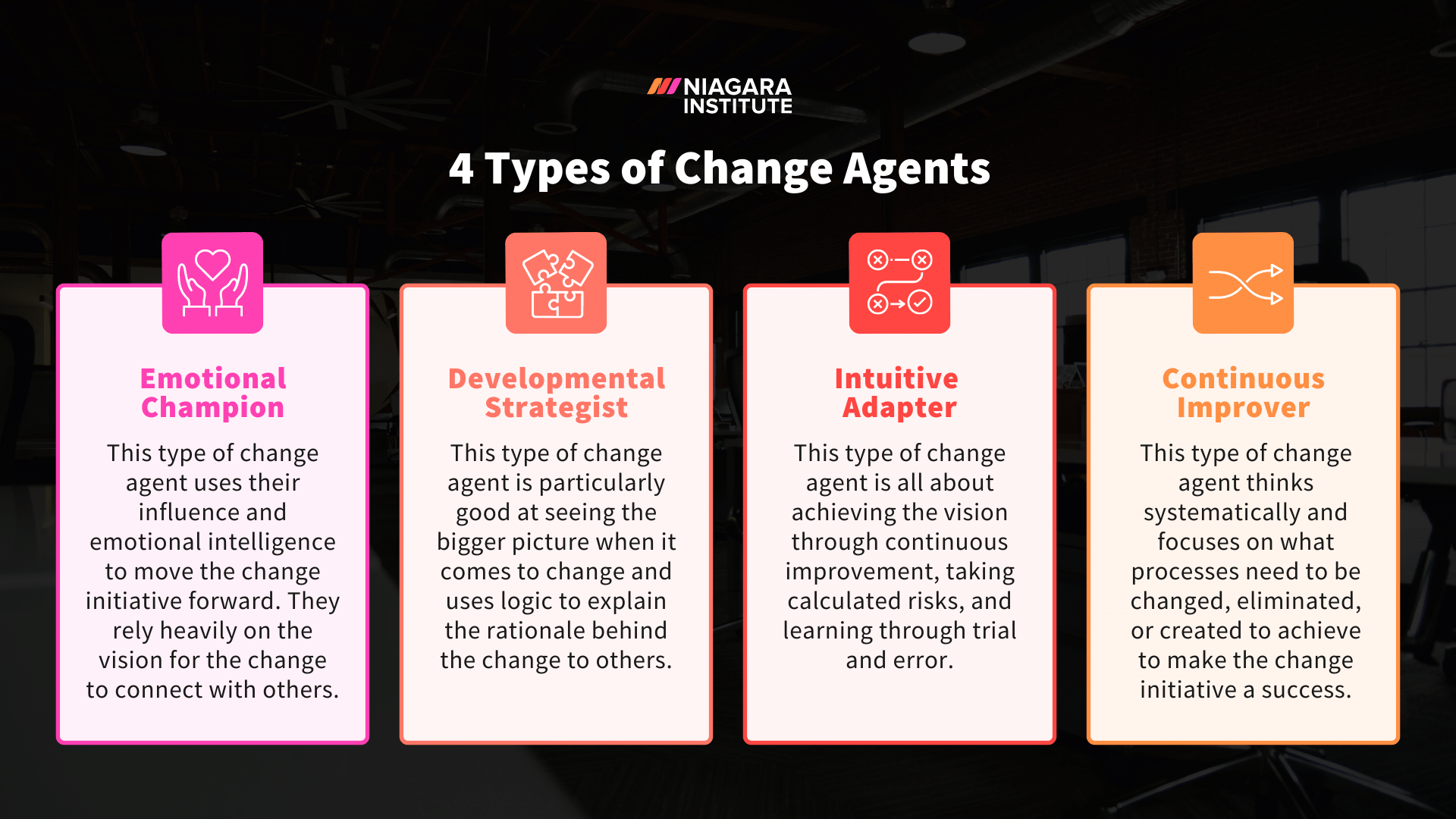3 min read
Change Readiness Assessment for Leaders
How ready are you for organizational change? Do you have the skills you need to confidently lead change? Does your team have the resources, capacity,...
3 min read
 Michelle Bennett
:
Nov 17, 2022 6:00:00 AM
Michelle Bennett
:
Nov 17, 2022 6:00:00 AM
.png)
No one sets out to introduce and implement organizational change initiatives that fail, and yet, Gartner found that half of change initiatives do, and only 34% of those that don’t are a clear success.
One possible reason for this that is often discussed is that there is a disconnect between upper management who create the strategy and those on the frontline who tactically have to implement it.
To alleviate this problem, a strong group of leaders and individual contributors must be able to use their authority, influence, and social capital to facilitate change from the middle. You may also know them as change agents.
In the following article, we’ll define what a change agent is in the workplace, outline the four common types of change agents, and discuss the five characteristics the best change agents have in common.
A change agent is someone who facilitates, coordinates, and manages organizational change initiatives. They are not responsible for creating the strategy but rather for encouraging its adoption and implementation among frontline leaders and employees. Change agents do this by wielding either formal or informal power, using their influence at the workplace, and tapping into their network of relationships.
McKinsey also notes that “[Change agents] provide technical know-how and the social support needed by managers and front line teams alike. [They] fix problems too by using their knowledge and contacts to detect and diffuse political issues that might otherwise threaten to derail the initiative.”
Given this, change agents can be middle managers, department heads, team leaders, or even those in the organization without formal authority, such as individual contributors with seniority, extensive experience, or strong interpersonal influence.
Every change agent will take a slightly different approach to the role depending on their past experiences, level of training, and personality type. But, of course, some similarities are bound to appear. In fact, the authors of “Organizational Change: An Action-Oriented Toolkit,” took a closer look at this and noted that it is common to see the following four types of change agents emerge in the workplace:

Facilitating, coordinating, and managing change is never easy, but having the right tools, skills, and qualities can help you. In fact, here are five characteristics that will help you be the best possible change agent you can possibly be:
Change rarely goes as planned. Therefore, change agents need to be resilient to respond, adapt, and overcome adversity, change, loss, and risk. According to Satir's Change Model, during the "chaos" stage, unexpected challenges and disruptions are common, testing the resilience of those involved. Resilience allows you to bounce back when things don’t go as planned and course correct as needed when crises arise.
With any change comes uncertainty and that uncertainty can breed resistance and fear if you let it. One way to counteract this is with transparency. Transparent change agents explain the rationale behind the change, openly communicate about metrics, own what they don’t know but are willing to figure out, and welcome questions that challenge them. It’s not easy to be transparent, but it is greatly respected and appreciated in today’s workplace.
Charismatic leadership is crucial for change agents, as it gives them the uncanny ability to motivate and inspire others to listen, follow, and take action. They do this through strong leadership communication, confidence, assertiveness, humility, and passion that connects with their audience on a deeper, emotional level.
When you have a plan for change, it can be challenging to handle difficult questions and accept things like criticism, feedback, or suggestions. But the fact is, those you are leading through change can have incredibly valuable and insightful feedback that are worth listening to. For that reason, being an open-minded change agent is crucial to success.
When you have empathy, you sense the emotions of others, try to see the world through their eyes, and make an effort to share their perspective. This is a crucial characteristic, as those implementing the change on the frontlines will need empathy from those leading them as they experience all the trials and tribulations that inevitably come with change.
As with nearly anything else in the workplace, becoming an effective change agent takes practice, time, and experience. Fortunately, you can accelerate that process by investing in development opportunities, such as Niagara Institute’s Change Management training program, that give you practical knowledge, hands-on practice, and tangible tools, rather than theory, that can be applied easily to your day-to-day life as a change agent.
.png)
3 min read
How ready are you for organizational change? Do you have the skills you need to confidently lead change? Does your team have the resources, capacity,...

5 min read
Change in the workplace takes on many forms. It can be a significant, organizational-wide transformation or an isolated initiative where the change...

5 min read
In business today, change has been constant. New ways of working, digital transformation, and shifting customer needs and expectations, almost every...